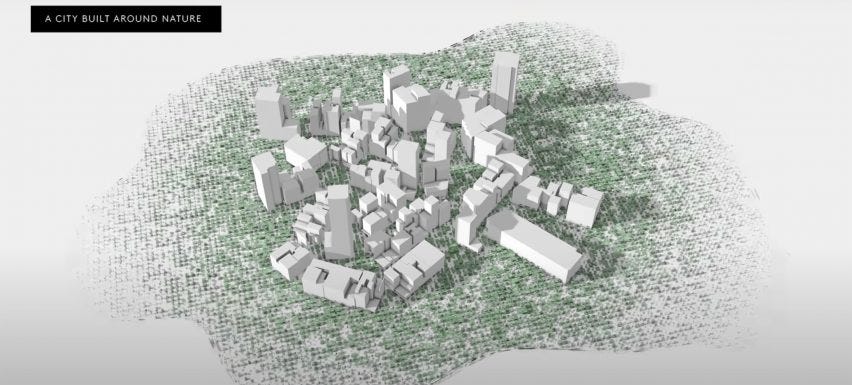Welcome to Just Two Things, which I try to write daily, five days a week. Some links may also appear on my blog from time to time. Links to the main articles are in cross-heads as well as the story
I’ve been trying to work out the logic of Saudi Arabia’s planned eco-city since I first read about it. It comes with lots of good noises. As Dezeen reported, it’s
a 100-mile belt of zero-energy walkable communities for a million people.
The linear city will have no cars or streets, with all residents living within a five-minute walk of essential facilities.
Its unusual feature, however, is that rather than being broadly circular, as most cities are, it runs in a line for 170km from the Red Sea coast to the north-west of the country.
I think we have to take this idea at face value. It’s a response to the climate change impacts that Saudi Arabia expects; it seems intent on investing oil revenues in a post-carbon transition:
Drawings show vehicles driven by artificial intelligence (AI), a metro line and high-speed freight transportation located underground. Overground will be a "pedestrian layer" supported by two underground layers – one "service layer" level of infrastructure directly underneath the ground and a lower-level "spine layer" for transport.
But there’s a reason why cities tend to be circular, and that’s because their economic gains come from their labour markets. They make access to employment more available; travel to work areas matter, even if more work is done virtually. The Line is supposed to have only a million inhabitants, so they are going to be pretty spread out. And the material impacts of travelling long distances are never less than travelling short distances.
In The Guardian, incidentally, Oliver Wainwright has a piece that links the concept to ideas developed by the radical Italian architects of the Superstudio Collective in the 1960s. Except: the Italians intended their idea to be a warning about the industrialisation of the planet.
#2: Mack the Knife
During the last lockdown I got a little obsessed about the Brecht/Weill song Mack The Knife. In particular I was curious about why it was that a song about a murderous criminal, written and performed in Weimar Germany by two radicals, based on an English operetta of the 18th century, had become a Number 1 hit for Bobby Darin in the late 1950s and then a ‘standard’.
I was overthinking this, as it happened. The reason it became a hit was because that’s how genre works.
But someone at the BBC was clearly worrying about the same thing, because just before Christmas the song was featured in the BBC’s wonderful Soul Music series. It turns out that the road from Berlin to the Billboard Top 100 runs via Theresienstadt and (spoilers) Auschwitz. Since it’s International Holocaust Remembrance Day today, it seems a good way to remember.
I think this also available outside the UK (30 minutes).
Notes from readers: Risk Registers. In response to yesterday’s piece on the 2020 UK Risk Register, Huw Williams of SAMI sent me a link to SAMI’s December newsletter, which looked at the COVID-19 pandemic in the UK through the lens of the 2017 Risk Register pandemic assessment:
If you identify high-impact high-likelihood risks, then explore around those risks in your planning. Don’t just use a single point forecast (“flu pandemic”); ask the “What If?” questions (What if the next pandemic is not flu? What if the next SARS is so mild that half of those that get infected don’t show symptoms? What if our isolation strategies don’t work?)
J2t#018
If you are enjoying Just Two Things, please do send it on to a friend or colleague.



